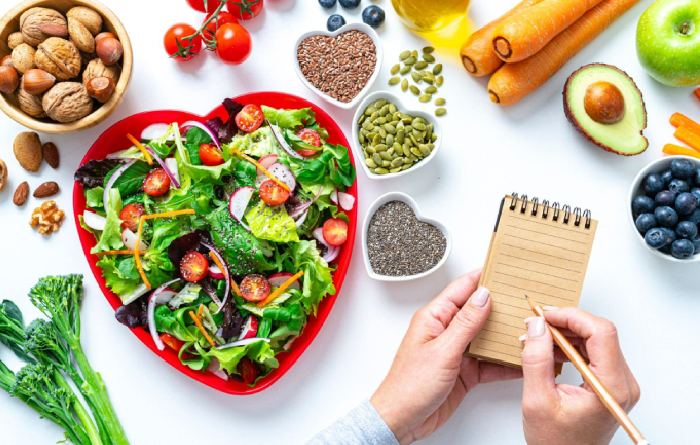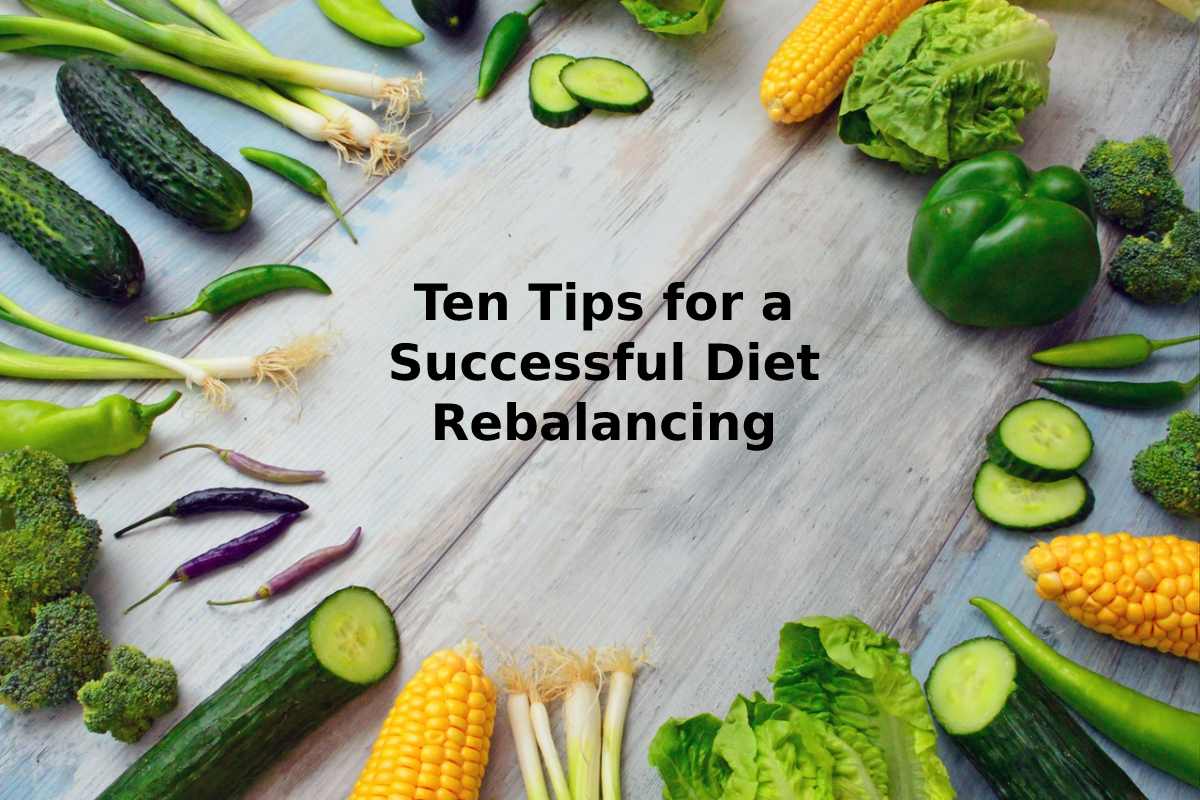Ten tips for a successful diet rebalancing – Why do diets not work? – Before starting a rebalancing program, it is essential to understand that it is not a diet but rather a type of eating that goes hand in hand with a healthy lifestyle. The rebalancing of the eating habits is then a long-term process and becomes much more than a diet, which, in the end, has a fixed duration.
Now that we have some hindsight on diets, we know that they are primarily swift initially but ineffective in the long term. They show breathtaking weight loss, but in the end, it doesn’t last long. 95% of dieters regain the weight they lost and sometimes even more. In totalling the fact that they are not sustainable over time, diets also cause a decrease in basal metabolic rate. It causes the body to go into hunger mode. People then gain the weight back as soon as they start eating “normally” again. Also, diets tend to cause or increase eating disorders. It can be dangerous.
It is a period to put an end to these damned ineffective diets. Eating a balanced diet eating healthy can be learned. Therefore,
Table of Contents
The Ten Tips for a Successful Diet Rebalancing

1) Take Your Time and Be Progressive
Start the rebalancing process with an analysis of your diet, document and inform yourself. Identifying your potential mistakes allows you to point out the changes you need to make. It will facilitate the transition.
It is also vital to income your time, to change one thing at a time. Progression and motivation are the keys to a successful and long-lasting diet rebalancing. Be gentle with yourself and remember where you started. Congratulations on how far you have come and how far you are going.
2) Reduce Industrial Products
The rebalancing course. And it is primarily this element that makes the strength of this way of life. However, some products should remain incomplete because of their dubious composition and potentially harmful health effects. These are, of course, industrial and ultra-processed products. These foods contain additives, refined sugar, too much salt, fats of poor quality or even dangerous, as well as chemical particles that unbalance our intestines and disturb our endocrine system.
Here is a list of foods to avoid:
- Prepared meals
- Sauces
- Canned food
- Cakes
- Sweets
- Fast food.
3) Reduce Packaging
To succeed in your dietary rebalancing, consider gradually reducing the proportion of packaged foods when you go shopping. You should favour raw foods, with as little packaging as possible. It indicates that the food has undergone minor modification and, therefore, its nutritional value or partially preserved.
In addition to life better for your health, unpackaged foods are better for the planet and pollute less.
4) Cook More – Ten Tips for a Successful Diet Rebalancing
Ten Tips for a Successful Diet Rebalancing – Decreasing the amount of industrial food in your diet means increasing the food you cook. It requires a specific organization. There are tons of tricks; find the ones that suit you best:
- Cooking from day today
- Batch cooking
- Meal prep
- Freeze leftovers
- Assemble raw foods.
Alternate between quick and straightforward recipes and more elaborate recipes that require more preparation. Use your imagination, share with your family and friends, ask for family recipes.
If you are new to the cuisine, you will quickly discover that cooking can be a fun activity. After weeks of practice, cooking will have no secrets for you!
5) Eat three Meals a Day
A colossal mistake often made when losing weight is cutting back on calories. And usually, this consists in skipping a meal, especially breakfast. But this is a mistake. Having a balanced breakfast is very important. It allows bringing energy to the body, which has fasted all night. But also reduces hunger during the day and consequently the untimely nibbling. Often responsible for weight gain and unwanted pounds.
All meals are essential. The body needs regularity and eating three meals a day is necessary. It allows you to feast your caloric intake over the day, prevent cravings, and give your body time to digest.
6) Increase the Number of Fruits and Vegetables
As we know, fruits and vegetables are the stars of diets. But this is not insignificant. Indeed, fruits and vegetables are rich in water. It makes them very low-calorie foods. And that’s not all. Their richness in fibre makes them very interesting: digestive stimulants and cardiovascular disease reducers. Finally, fruits and vegetables are a significant source of vitamins and minerals essential to the proper functioning of the body.
Go if you are not a fan. Start with a piece of fruit for dessert at lunch and a raw vegetable in the evening. Little by little, add a fruit in the morning and a cooked vegetable at lunchtime. The ideal is to eat two portions of fruit and three portions of raw and cooked vegetables per day.
7) Increase your Water Consumption

With our hectic lifestyles, we tend to forget to drink. Big mistake! Water makes up about 60% of our bodies. Water allows, among other things, the numerous chemical reactions within the cells, breathing, the drainage of tissues, and the evacuation of waste. This element is therefore essential to our proper functioning. Dehydration can cause a decrease in physical and mental capacities, headaches, kidney and digestive problems. Our water needs are not to be busy lightly.
On average, we need to drink 1.5l of water per day. It can alienate into 1l of drinking water (tea, coffee, water, infusions) and 500ml of food water from water-rich foods (fruits and vegetables, milk, yoghurt, white fish).
8) Do not Reduce Calories to a Minimum
As we have explained, food rebalancing is different from diets. In particular, it is not necessary to count calories to reduce them to a minimum. It is more interesting to complete the macro-nutrients without looking at the caloric total alone. It becomes mentally and physically unhealthy and incredibly counterproductive if you look to lower as much as possible. Under these conditions, the body and mind alternate between frustration, hunger, overeating, stress and guilt. Emotions and states are not sustainable in the long run.
Therefore, calorie counting alone is not recommended, nor is it advisable when rebalancing your diet. It is the distribution of calories that counts the most.
9) Practice Regular Physical Activity
If a balanced diet is part of a healthy lifestyle, then the sport is also part of it. Mark has long beneficial effects on health: increased basal metabolic rate, reduced stress, increased overall physical capacity, better heart health, improved immune system, weight maintenance and body composition. Its interest in daily life is therefore no longer to be proven.
As for the other elements, if you are not a fan, start slowly. Start by walking a little more each day increase your overall activity with everyday activities (cleaning, gardening, crafts, dancing). Try new belongings and find the sport that suits you little by little. It is an important notion: enjoy what you do so that sport is not a constraint. There is not only running or cycling. Be curious!
10) Listen to Your Body
Last but not least. Listening to your body means being as close as possible to its needs. Listening to and understanding your food sensations is very important because it allows you to correct yourself. There are different food sensations: hunger, appetite, satiety, desire, fullness, disgust. Some are mainly physiological (hunger) and others are psychological (craving). The difficulty comes in this: knowing how to distinguish a primary need from a secondary market. When you learn to differentiate between hunger and desires, you instinctively reduce unnecessary snacking, which reduces your total caloric intake, and you see a weight loss. Listening to your food sensations allows you to regulate your food intake and, consequently, better weight management. And very often, an improvement of the global mental health in parallel thanks to reducing frustration in particular.
So can take time and be difficult if you are not accompanied by a professional. Do not hesitate to contact a registered dietician.
There you consume it; you now have all the cards in hand to succeed in your diet rebalancing. If you have to remember one thing, take your time and don’t miss out on the pleasure.

